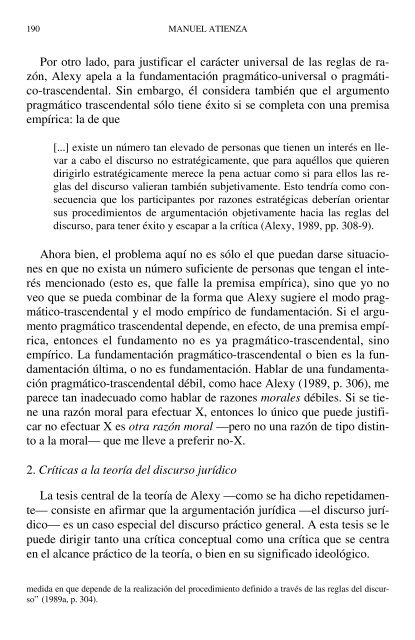LAS RAZONES DEL DERECHO Teo rías de la ar gu men ta ción ju rí di ca
You also want an ePaper? Increase the reach of your titles
YUMPU automatically turns print PDFs into web optimized ePapers that Google loves.
190 MANUEL ATIENZA<br />
Por otro <strong>la</strong>do, p<strong>ar</strong>a <strong>ju</strong>stific<strong>ar</strong> el c<strong>ar</strong>ácter universal <strong>de</strong> <strong>la</strong>s reg<strong>la</strong>s <strong>de</strong> razón,<br />
Alexy ape<strong>la</strong> a <strong>la</strong> funda<strong>men</strong><strong>ta</strong><strong>ción</strong> pragmático-universal o pragmático-trascen<strong>de</strong>n<strong>ta</strong>l.<br />
Sin emb<strong>ar</strong>go, él consi<strong>de</strong>ra <strong>ta</strong>mbién que el <strong>ar</strong><strong>gu</strong><strong>men</strong>to<br />
pragmático trascen<strong>de</strong>n<strong>ta</strong>l sólo tiene éxito si se comple<strong>ta</strong> con una premisa<br />
empíri<strong>ca</strong>: <strong>la</strong> <strong>de</strong> que<br />
[...] existe un número <strong>ta</strong>n elevado <strong>de</strong> personas que tienen un interés en llev<strong>ar</strong><br />
a <strong>ca</strong>bo el <strong>di</strong>scurso no estratégi<strong>ca</strong><strong>men</strong>te, que p<strong>ar</strong>a aquéllos que quieren<br />
<strong>di</strong>rigirlo estratégi<strong>ca</strong><strong>men</strong>te merece <strong>la</strong> pena actu<strong>ar</strong> como si p<strong>ar</strong>a ellos <strong>la</strong>s reg<strong>la</strong>s<br />
<strong>de</strong>l <strong>di</strong>scurso valieran <strong>ta</strong>mbién subjetiva<strong>men</strong>te. Esto tend<strong>rí</strong>a como consecuencia<br />
que los p<strong>ar</strong>ticipantes por razones estratégi<strong>ca</strong>s <strong>de</strong>be<strong>rí</strong>an orient<strong>ar</strong><br />
sus proce<strong>di</strong>mientos <strong>de</strong> <strong>ar</strong><strong>gu</strong><strong>men</strong><strong>ta</strong><strong>ción</strong> objetiva<strong>men</strong>te hacia <strong>la</strong>s reg<strong>la</strong>s <strong>de</strong>l<br />
<strong>di</strong>scurso, p<strong>ar</strong>a tener éxito y es<strong>ca</strong>p<strong>ar</strong> a <strong>la</strong> c<strong>rí</strong>ti<strong>ca</strong> (Alexy, 1989, pp. 308-9).<br />
Ahora bien, el problema aquí no es sólo el que puedan d<strong>ar</strong>se situaciones<br />
en que no exis<strong>ta</strong> un número suficiente <strong>de</strong> personas que tengan el interés<br />
<strong>men</strong>cionado (esto es, que falle <strong>la</strong> premisa empíri<strong>ca</strong>), sino que yo no<br />
veo que se pueda combin<strong>ar</strong> <strong>de</strong> <strong>la</strong> forma que Alexy sugiere el modo pragmático-trascen<strong>de</strong>n<strong>ta</strong>l<br />
y el modo empírico <strong>de</strong> funda<strong>men</strong><strong>ta</strong><strong>ción</strong>. Si el <strong>ar</strong><strong>gu</strong><strong>men</strong>to<br />
pragmático trascen<strong>de</strong>n<strong>ta</strong>l <strong>de</strong>pen<strong>de</strong>, en efecto, <strong>de</strong> una premisa empíri<strong>ca</strong>,<br />
entonces el funda<strong>men</strong>to no es ya pragmático-trascen<strong>de</strong>n<strong>ta</strong>l, sino<br />
empírico. La funda<strong>men</strong><strong>ta</strong><strong>ción</strong> pragmático-trascen<strong>de</strong>n<strong>ta</strong>l o bien es <strong>la</strong> funda<strong>men</strong><strong>ta</strong><strong>ción</strong><br />
última, o no es funda<strong>men</strong><strong>ta</strong><strong>ción</strong>. Hab<strong>la</strong>r <strong>de</strong> una funda<strong>men</strong><strong>ta</strong><strong>ción</strong><br />
pragmático-trascen<strong>de</strong>n<strong>ta</strong>l débil, como hace Alexy (1989, p. 306), me<br />
p<strong>ar</strong>ece <strong>ta</strong>n ina<strong>de</strong>cuado como hab<strong>la</strong>r <strong>de</strong> razones morales débiles. Si se tiene<br />
una razón moral p<strong>ar</strong>a efectu<strong>ar</strong> X, entonces lo único que pue<strong>de</strong> <strong>ju</strong>stific<strong>ar</strong><br />
no efectu<strong>ar</strong> X es otra razón moral —pero no una razón <strong>de</strong> tipo <strong>di</strong>stinto<br />
a <strong>la</strong> moral— que me lleve a preferir no-X.<br />
2. C<strong>rí</strong>ti<strong>ca</strong>s a <strong>la</strong> teo<strong>rí</strong>a <strong>de</strong>l <strong>di</strong>scurso <strong>ju</strong><strong>rí</strong><strong>di</strong>co<br />
La tesis central <strong>de</strong> <strong>la</strong> teo<strong>rí</strong>a <strong>de</strong> Alexy —como se ha <strong>di</strong>cho repetida<strong>men</strong>te—<br />
consiste en afirm<strong>ar</strong> que <strong>la</strong> <strong>ar</strong><strong>gu</strong><strong>men</strong><strong>ta</strong><strong>ción</strong> <strong>ju</strong><strong>rí</strong><strong>di</strong><strong>ca</strong> —el <strong>di</strong>scurso <strong>ju</strong><strong>rí</strong><strong>di</strong>co—<br />
es un <strong>ca</strong>so especial <strong>de</strong>l <strong>di</strong>scurso práctico general. A es<strong>ta</strong> tesis se le<br />
pue<strong>de</strong> <strong>di</strong>rigir <strong>ta</strong>nto una c<strong>rí</strong>ti<strong>ca</strong> conceptual como una c<strong>rí</strong>ti<strong>ca</strong> que se centra<br />
en el al<strong>ca</strong>nce práctico <strong>de</strong> <strong>la</strong> teo<strong>rí</strong>a, o bien en su signifi<strong>ca</strong>do i<strong>de</strong>ológico.<br />
me<strong>di</strong>da en que <strong>de</strong>pen<strong>de</strong> <strong>de</strong> <strong>la</strong> realiza<strong>ción</strong> <strong>de</strong>l proce<strong>di</strong>miento <strong>de</strong>finido a través <strong>de</strong> <strong>la</strong>s reg<strong>la</strong>s <strong>de</strong>l <strong>di</strong>scurso”<br />
(1989a, p. 304).



